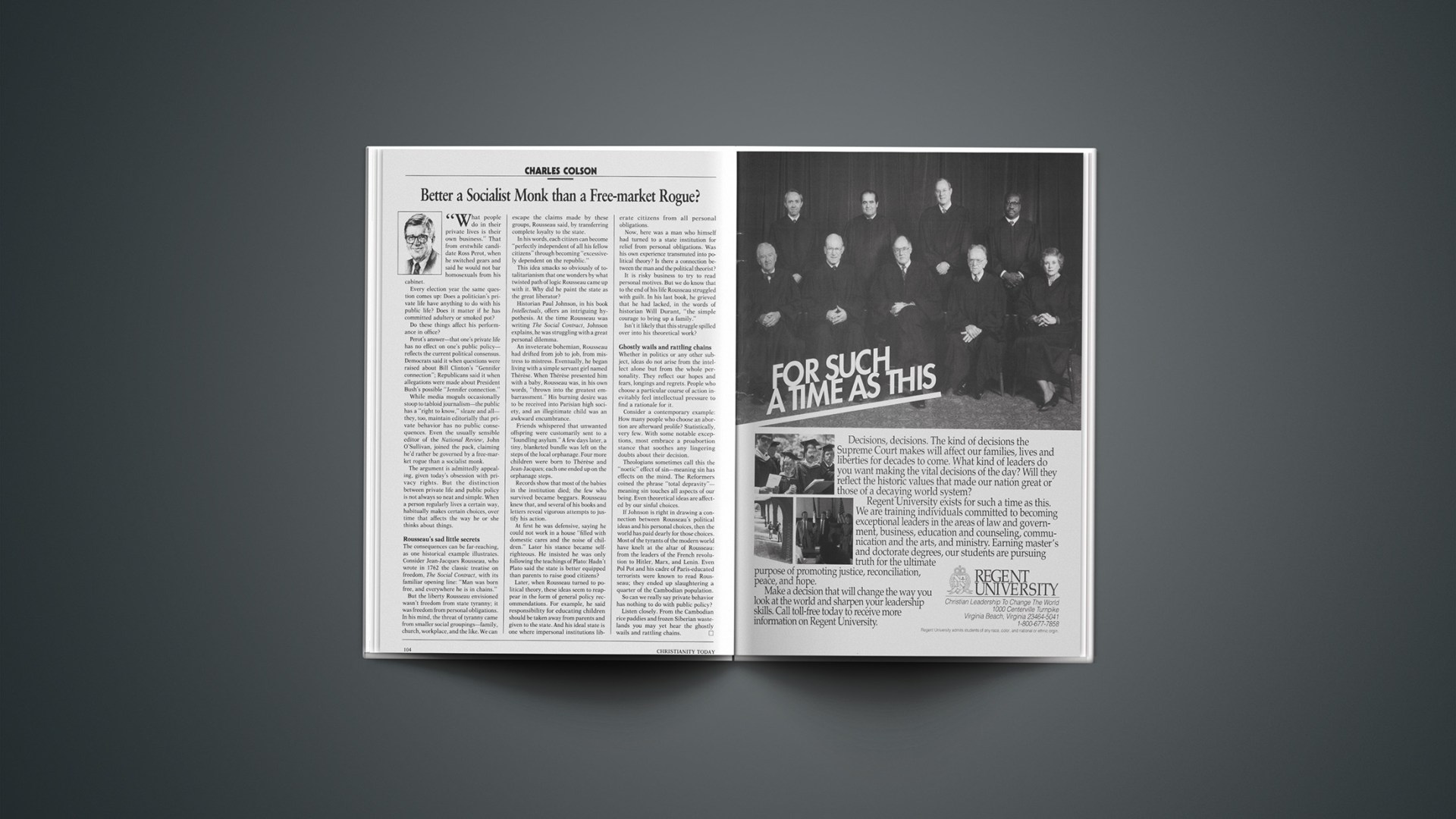“What people do in their private lives is their own business.” That from erstwhile candidate Ross Perot, when he switched gears and said he would not bar homosexuals from his Every election year the same question comes up: Does a politician’s private life have anything to do with his public life? Does it matter if he has committed adultery or smoked pot?
Do these things affect his performance in office?
Perot’s answer—that one’s private life has no effect on one’s public policy—reflects the current political consensus. Democrats said it when questions were raised about Bill Clinton’s “Gennifer connection”; Republicans said it when allegations were made about President Bush’s possible “Jennifer connection.”
While media moguls occasionally stoop to tabloid journalism—the public has a “right to know,” sleaze and all—they, too, maintain editorially that private behavior has no public consequences. Even the usually sensible editor of the National Review, John O’Sullivan, joined the pack, claiming he’d rather be governed by a free-market rogue than a socialist monk.
The argument is admittedly appealing, given today’s obsession with privacy rights. But the distinction between private life and public policy is not always so neat and simple. When a person regularly lives a certain way, habitually makes certain choices, over time that affects the way he or she thinks about things.
Rousseau’S Sad Little Secrets
The consequences can be far-reaching, as one historical example illustrates. Consider Jean-Jacques Rousseau, who wrote in 1762 the classic treatise on freedom, The Social Contract, with its familiar opening line: “Man was born free, and everywhere he is in chains.”
But the liberty Rousseau envisioned wasn’t freedom from state tyranny; it was freedom from personal obligations. In his mind, the threat of tyranny came from smaller social groupings—family, church, workplace, and the like. We can escape the claims made by these groups, Rousseau said, by transferring complete loyalty to the state.
In his words, each citizen can become “perfectly independent of all his fellow citizens” through becoming “excessively dependent on the republic.”
This idea smacks so obviously of totalitarianism that one wonders by what twisted path of logic Rousseau came up with it. Why did he paint the state as the great liberator?
Historian Paul Johnson, in his book Intellectuals, offers an intriguing hypothesis. At the time Rousseau was writing The Social Contract, Johnson explains, he was struggling with a great personal dilemma.
An inveterate bohemian, Rousseau had drifted from job to job, from mistress to mistress. Eventually, he began living with a simple servant girl named Thérèse. When Thérèse presented him with a baby, Rousseau was, in his own words, “thrown into the greatest embarrassment.” His burning desire was to be received into Parisian high society, and an illegitimate child was an awkward encumbrance.
Friends whispered that unwanted offspring were customarily sent to a “foundling asylum.” A few days later, a tiny, blanketed bundle was left on the steps of the local orphanage. Four more children were born to Thérèse and Jean-Jacques; each one ended up on the orphanage steps.
Records show that most of the babies in the institution died; the few who survived became beggars. Rousseau knew that, and several of his books and letters reveal vigorous attempts to justify his action.
At first he was defensive, saying he could not work in a house “filled with domestic cares and the noise of children.” Later his stance became self-righteous. He insisted he was only following the teachings of Plato: Hadn’t Plato said the state is better equipped than parents to raise good citizens?
Later, when Rousseau turned to political theory, these ideas seem to reappear in the form of general policy recommendations. For example, he said responsibility for educating children should be taken away from parents and given to the state. And his ideal state is one where impersonal institutions liberate citizens from all personal obligations.
Now, here was a man who himself had turned to a state institution for relief from personal obligations. Was his own experience transmuted into political theory? Is there a connection between the man and the political theorist?
It is risky business to try to read personal motives. But we do know that to the end of his life Rousseau struggled with guilt. In his last book, he grieved that he had lacked, in the words of historian Will Durant, “the simple courage to bring up a family.”
Isn’t it likely that this struggle spilled over into his theoretical work?
Ghostly Wails And Rattling Chains
Whether in politics or any other subject, ideas do not arise from the intellect alone but from the whole personality. They reflect our hopes and fears, longings and regrets. People who choose a particular course of action inevitably feel intellectual pressure to find a rationale for it.
Consider a contemporary example: How many people who choose an abortion are afterward prolife? Statistically, very few. With some notable exceptions, most embrace a proabortion stance that soothes any lingering doubts about their decision.
Theologians sometimes call this the “noetic” effect of sin—meaning sin has effects on the mind. The Reformers coined the phrase “total depravity”—meaning sin touches all aspects of our being. Even theoretical ideas are affected by our sinful choices.
If Johnson is right in drawing a connection between Rousseau’s political ideas and his personal choices, then the world has paid dearly for those choices. Most of the tyrants of the modern world have knelt at the altar of Rousseau: from the leaders of the French revolution to Hitler, Marx, and Lenin. Even Pol Pot and his cadre of Paris-educated terrorists were known to read Rousseau; they ended up slaughtering a quarter of the Cambodian population.
So can we really say private behavior has nothing to do with public policy?
Listen closely. From the Cambodian rice paddies and frozen Siberian wastelands you may yet hear the ghostly wails and rattling chains.










